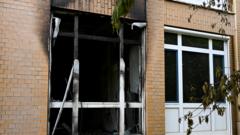Pneumonia can be particularly dangerous for elderly individuals. Health experts weigh in on the potential risks associated with Pope Francis's condition, emphasizing the need for careful monitoring during his recovery.
Pope Francis Hospitalized with Bilateral Pneumonia: A Serious Health Concern

Pope Francis Hospitalized with Bilateral Pneumonia: A Serious Health Concern
The Vatican confirms that Pope Francis is suffering from bilateral pneumonia, raising concerns for his health, especially given his advanced age.
Pope Francis is currently hospitalized due to bilateral pneumonia, a condition characterized by pneumonia affecting both lungs, as announced by the Vatican on Tuesday. This diagnosis raises concern among health professionals, particularly considering the Pope's age of 88 years. Dr. James Musser, director of the center for infectious diseases at the Houston Methodist Research Institute, explained that pneumonia typically involves an infection in the small airways of the lungs, leading to an inflammatory response filled with immune cells, which can manifest in symptoms like fever, cough, and chills.
Diagnosis of pneumonia usually involves a physical examination, wherein doctors assess breath sounds with a stethoscope. In the case of pneumonia patients, their vocalization of a prolonged "e" can sound abnormal due to the condition. Dr. Paul Pottinger, an infectious diseases professor at the University of Washington, noted that while pneumonia is manageable for many patients, it poses greater risks for older adults.
Dr. Peter Chin-Hong, a professor of medicine and infectious diseases at the University of California, San Francisco, highlighted that the mortality rate for pneumonia rises significantly after age 85. Streptococcus pneumoniae is often the main bacterial culprit of pneumonia, with Dr. Chin-Hong stating that it is the leading cause of this condition. Antibiotics are typically effective against bacterial pneumonia, however, complications such as sepsis can occur if the infection spreads from the lungs.
Vaccination can help defend against the risk of sepsis but does not eliminate the possibility of developing pneumonia. Dr. Pottinger pointed out that although streptococcus can affect both lungs, often only one lobe of a single lung is involved in such cases. In many instances, bilateral pneumonia is caused by viral infections, including influenza, or other bacteria, such as R.S.V., Legionella, mycoplasma, and chlamydia.
Both experts concurred on the serious nature of the Pope's health condition, calling it a "very scary situation" that necessitates close observation and care during his recovery.




















